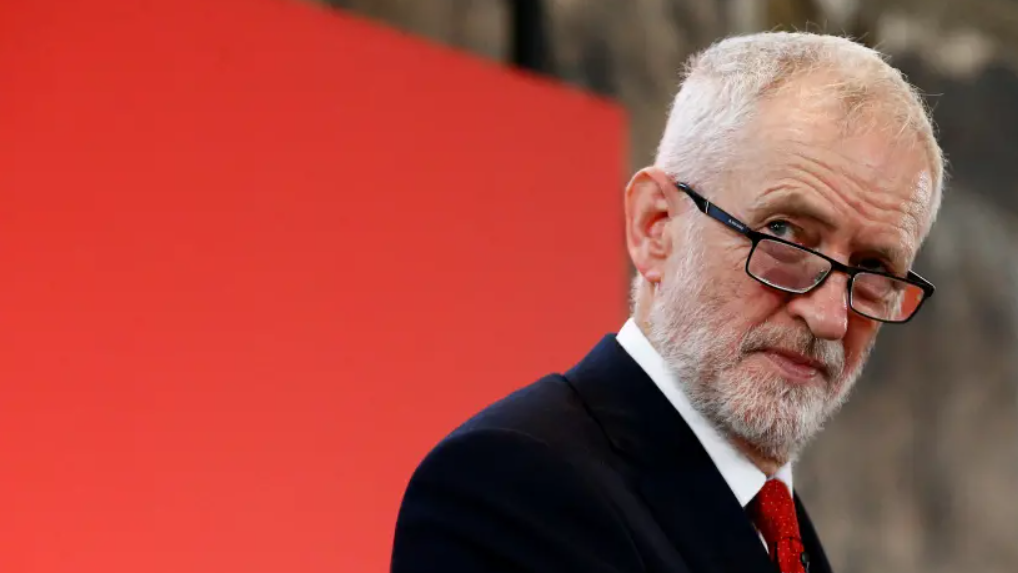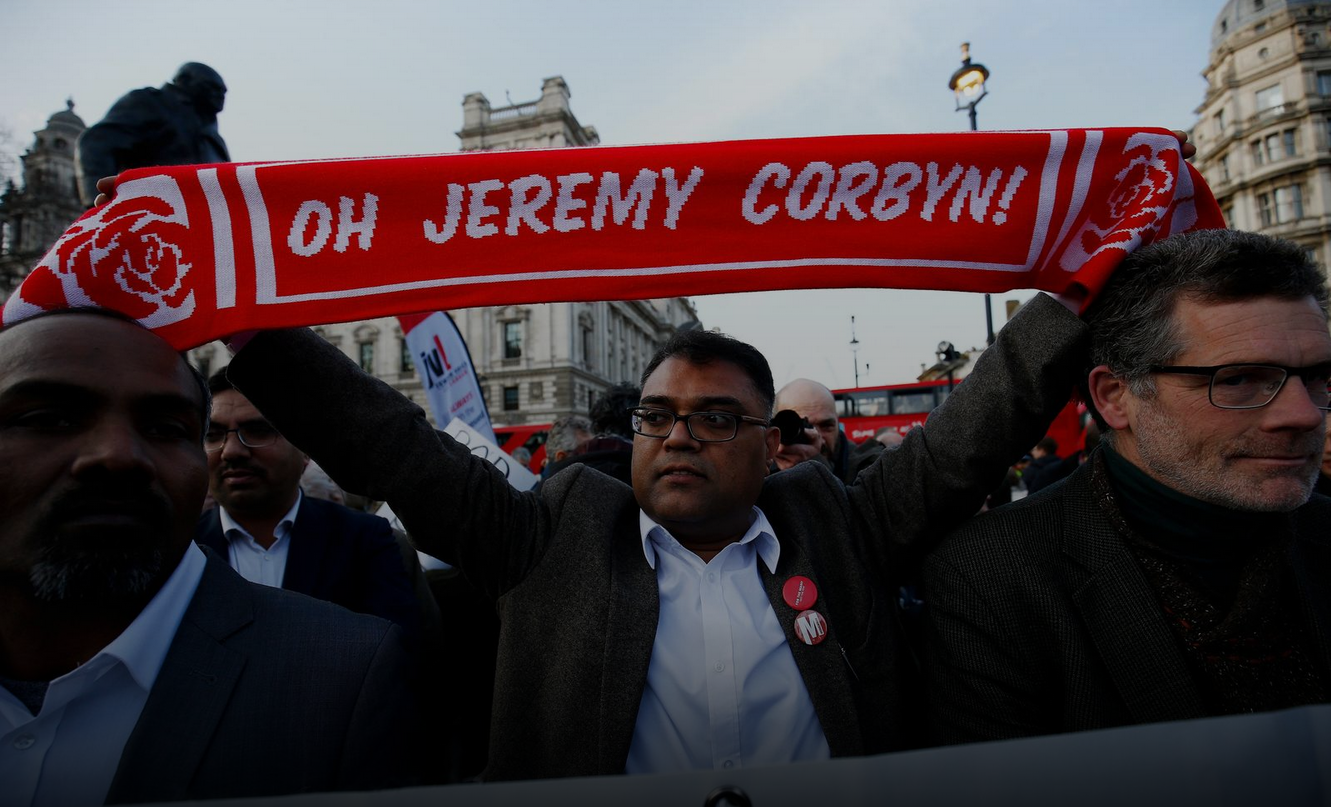
Britain's opposition Labor Party leader Jeremy Corbyn reacts at a launch event for the Labor party's general election campaign in London, Britain October 31, 2019. /Reuters
Britain's opposition Labor Party leader Jeremy Corbyn reacts at a launch event for the Labor party's general election campaign in London, Britain October 31, 2019. /Reuters
Anti-Semitism is once again being associated with Jeremy Corbyn. This time, the former Labor leader paid a big price for purportedly downplaying the problem in his party.
Corbyn was suspended last week by the party leadership for stating "anti-Semitism in Labor was dramatically overstated" after Britain's Equality and Human Rights Commission (EHRC) produced a report identifying his failure in preventing "acts of harassment and discrimination" against Jewish people. For those who feel betrayed by Labor's inaction, the suspension comes as a relief as Corbyn has long been accused of letting anti-Smitism slide under his watch while not bearing any tangible consequences. Those who are close to Corbyn, however, have come to his defense and protested the suspension.
Anti-Semitism accusations against Corbyn and the Labor Party have been a constant source of tension in British politics, an unshakable charge dogging Corbyn's political career ever since he entered the race for party leadership five years ago. That said, hardly anyone associates Corbyn himself with the term racist, even though media circles have overwhelmingly pointed to his negligence after the EHRC report surfaced.
"Corbyn may not have an anti-Semitic bone in his body, but he does share platforms with people who do," political journalist James Bloodworth wrote in the Guardian when Corbyn was considered the favorite of the leadership contest in 2015.
At the time, Corbyn was found to have praised and defended people who had either made very problematic remarks or breached the law for promoting bigotry against Jewish people.
But underneath these controversial connections lies Corbyn's fervent support for the Palestinian aspiration of a nationhood. Often described by his opponents as one who "really listens to the people," Corbyn is long known for his proclivity to champion the cause of the underprivileged. And that compassion of his extends far beyond British borders and focuses extensively on those suffering from Israel's assertive policies, making him one of the rare species among not just top British politicians but also the entire EU leadership which often threads lightly on their relations with Israel.

Israeli and Palestinian youngsters waving their flags in Jerusalem. /Reuters
Israeli and Palestinian youngsters waving their flags in Jerusalem. /Reuters
The anti-war campaigner has courted members of Hamas, a Gaza-based Islamist movement designated as a terrorist group by the EU and the U.S., endorsed activities held by the BDS movement, an international boycott campaign against the Israeli occupation of Palestinian territories, and personally traded barbs with Israel's longtime Prime Minister Benjamin Netanyahu, all of which added to the ammunition his political foes have capitalized but all the while demonstrated how his foreign policy priorities may be misinterpreted as a behavioral pattern reek of anti-Semitism.
Still, many have argued that his hard stance on Israel could not explain away his indifference for the prevalence of anti-Semitism that has long plagued the Labor Party.
During the four-and-half years of Corbyn's leadership, hundreds of complaints about alleged anti-Semitic comments have been filed against Labor members, with accusations centered around the raging use of anti-Semitic tropes and the failure to keep criticism of Israel within certain boundaries. On top of that, the party has also been accused of not taking the issue seriously and going too easy on its rule-breaking members. Supporting this assertion were allegations including the party leadership's interference with the process of dealing with antisemitism complaints as well as its hasty and constant dismissal of outcries as politically motivated smears.
Coupled with the increased amount of controversies accompanying Corbyn's leadership, a breakdown in trust between the Labor Party and the Jewish community has become evident. When he was at the helm, a notable number of Jewish members have quit the party citing its lack of action to address anti-Semitism concerns.
While most of these charges have been reflected by the EHRC report, the conclusion of which points to "a culture within the party which, at best, did not do enough to prevent anti-Semitism and, at worst, could be seen to accept it," Corbyn, who has consistently placed the fight against racism as a top priority, firmly rejected some of its findings.

Supporters of Britain's opposition Labor Party attend a demonstration organized by the British Board of Jewish Deputies for those who oppose anti-Semitism, in Parliament Square in London, Britain, March 26, 2018. /Reuters
Supporters of Britain's opposition Labor Party attend a demonstration organized by the British Board of Jewish Deputies for those who oppose anti-Semitism, in Parliament Square in London, Britain, March 26, 2018. /Reuters
He said that although the problem with anti-Semitism did exist in the Labor Party, "a false impression has been created of the number of members accused of anti-Semitism." This is a stand consistent with his long-held position. Last year, when Britain's Chief Rabbi denounced Labor's indulgence of anti-Semitism in some of the strongest terms, Corbyn insisted his party was taking serious measures to stamp out anti-Semitism and skipped apologizing for what he believed was not the case under his watch.
Corbyn's account is not entirely without its merit. His supporters have claimed that the party's complaints system had been substantially improved to process anti-Semitism accusations and that the party had been transparent in releasing statistics on anti-Semitism cases as well as the number of suspensions and expulsions it carried out against the members who breached the code, even though it still fell short of what critics say is sufficient to combat the epidemic.
Another matter that puts the party's antisemitism problem under debate has to do with the very contentious question over whether certain types of criticism against Israel would also fall into the category of antisemitism. Some argue that disapproval of Israel can be used as a coded attack on Jews, while others say the Israeli government and its supporters are deliberately confusing it with anti-Semitism. Rejecting Israel's entire existence, for example, is by definition an act of antisemitism, and some Labor members who are critical of Israeli policies can be viewed as failing to differentiate them apart.
While hardly anyone can say with certainty whether Corbyn has made serious efforts to root out the problem, his party, along with the bulk of British commentators, have certainly turned against him after he refused to acknowledge the EHRC ruling, an attitude they believe was exactly what helped foment antisemitism in the party, despite his apparent rejection of the act itself.